According to Chinese physiognomy, nasolabial folds are a reflection of a person’s destiny. It is by them that one can determine how lucky, strong and stable a person is.
The Chinese call the nasolabial lines "fa-ling". It is generally accepted that these lines become noticeable by the age of 20, and are fully formed only by the age of 40–50. It is during this period that the importance of nasolabial folds is most relevant.
Note
In men, fa-lin lines are formed earlier, in women - 5-10 years later.
The most common types of nasolabial folds are:
Stability fold
This is the most common form of nasolabial fold (Fig. 6.24).
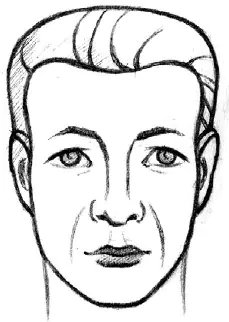
Rice. 6.24.Stability fold
The lines resemble a curve from a mathematical graph and symbolize constancy and small but stable success and prosperity.
Fold of need
People with straight nasolabial folds, running obliquely and forming a triangle with the nose and chin (Fig. 6.25), have a difficult life, sending many challenges.
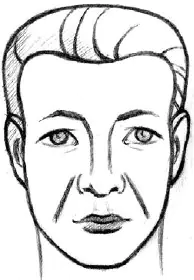
Rice. 6.25.Fold of need
In addition, people with such nasolabial folds should always be extremely attentive to themselves in order to minimize the harmful effects of diseases, especially the respiratory system.
Fold of disease
Nasolabial folds of this type usually have a shortened shape and do not extend beyond the lips (Fig. 6.26).
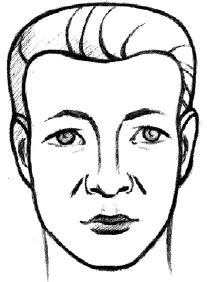
Rice. 6.26.Fold of disease
Short nasolabial folds, especially in combination with a thin nose and pointed chin, indicate a person with weak immunity, susceptible to various diseases. People with such folds should monitor their health very carefully.
A fold of extraordinary power
A fold of extraordinary power (Fig. 6.27) in combination with wrinkles from the chin to the middle of the cheeks indicates an excellent physical and spiritual form of a person.
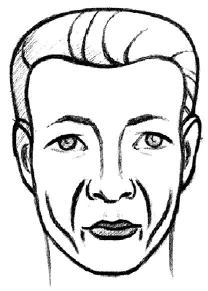
Rice. 6.27.A fold of extraordinary power
Such people, as a rule, have great potential for achieving significant heights in their professional activities and harmony in their personal lives.
The fold of late success
Signs of late success can be considered several lines running from the base of the nose to the lips (without touching them) and from the corners of the mouth to the chin (Fig. 6.28).
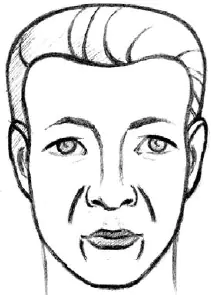
Rice. 6.28.The fold of late success
Late success refers to significant achievements in political and business interests after age 50.
Fold of significance
The nasolabial fold, shaped like an inverted bowl (Fig. 6.29), is often called the sign of especially important persons, or the fold of significance.
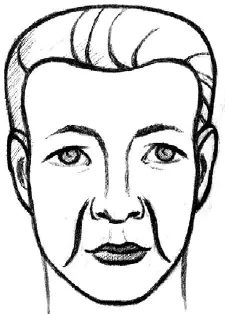
Rice. 6.29.Fold of significance
It is quite rare and characterizes its owners as aristocratic, noble and intellectual persons occupying a high position in society.
The fold of the terrible end
Unfortunately, sometimes people have nasolabial folds that start at the base of the nose and end at the corners of the mouth (Fig. 6.30) or cross the cheeks from the corners of the mouth to the lower eyelid (Fig. 6.31). These folds are called dire end folds.
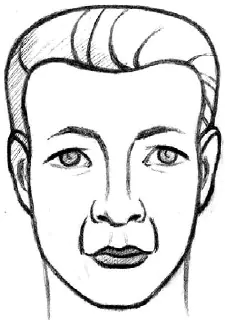
Rice. 6.30.Folds starting at the base of the nose and ending at the corners of the mouth
Chinese physiognomists also call these lines “a flying snake that enters the mouth” and believe that people with such folds often end their lives tragically. And lines stretching from the corners of the mouth to the lower eyelids indicate misfortune or premature death.
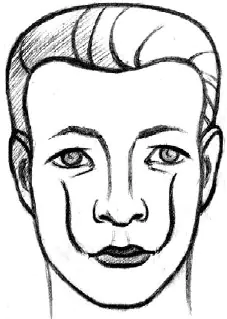
Rice. 6.31.Folds crossing the cheeks from the corners of the mouth to the lower eyelid
If you dream about your nose...
Seeing your own nose in a dream means the need to demonstrate strength of character and the realization that it is necessary to complete the work started.
If in a dream your own nose seems too small, then you should prepare for the possibility of failure in business.
A large nose symbolizes quick wealth or the patronage of a rich person.
A small nose warns of injustice. A red nose dreams of illness.
Plugging your nose or seeing your nose plugged is unlucky. Losing your nose means divorce.
Grabbing your nose means success in love or finding a true friend. A swollen nose dreams of wealth.
A bleeding nose seen in a dream predicts misfortune for anyone seeing this dream.
Hair growing on the nose signifies extraordinary undertakings made possible through willpower or character.
(nose, lips, folds, wrinkles, cheeks, mouth)
 |
The two lines of the cheeks, running from the top of the wings of the nose to the sides of the chin and covering the corners of the mouth, are called Fa-Ling in Chinese, says Professor WANG. — A man should have fairly noticeable Fa-Ling lines by the age of 30.
If these lines are already expressed by the age of 20, then he has matured early, but if by the age of 30 the lines have not yet been defined, this is a sign of delayed maturation.
Women rarely have pronounced Fa-Ling by age 30 or even 40. However, as soon as they begin to actively pursue a career, these lines appear. By the age of fifty, these two lines are finally determined on the face, and it is believed that at this time they begin to influence the fate of a person.

Stability sign
Cheek lines - balanced curves on both sides of the face at some distance from the corners of the mouth. This type of line is found in the “average” person with a fair degree of success and a small but stable income.

Sign of need
Straight, running from the tips of the wings of the nostrils to the very end nasolabial folds, although they do not touch the corners of the mouth, indicate a bitter battle for life. Such people are often haunted by poverty and illness.

Illness sign
Short Fa-Ling lines combined with thin nose, turned out nostrils, crooked mouth And pointed chin is a combination of the worst features of the lower face. And it belongs to a person who is in perpetual poverty and suffering from a protracted illness that can lead to early death [en].

Sign of Extraordinary Power
People who, in addition to nasolabial folds and lines around the lips, also have wrinkles, going up from the chin to the middle of the cheeks, have very great potential and can reach the highest heights in the political or financial world. A striking example is the face of the 36th President of the United States, ruling from 1963 to 1969, Lyndon Johnson.

A sign of success at age 60
If cheek lines end somewhere near the corners of the mouth, but do not touch them, and from the corners of the mouth another pair of lines emanates, going to the chin, then this person will have great success in life by the age of 60.

VIP Badge
Noble cheek lines - these are those that begin with a smooth line and, diverging in a graceful bend, disappear to the side. Such lines occur among intellectuals who occupy a high position in society.
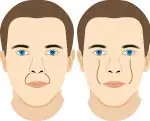
Signs of a terrible end
“The two lines of the cheeks, running from the top of the wings of the nose to the sides of the chin and covering the corners of the mouth, are called Fa-Ling in Chinese,” says Professor Wang. – A man should have fairly noticeable Fa-Ling lines by the age of thirty. If these lines are already expressed by the age of twenty, then he has matured early, but if by the age of thirty the lines have not yet been defined, this is a sign of delayed maturation. Women rarely have pronounced Fa-Ling by the age of thirty or even forty. However, as soon as they begin to actively pursue a career, these lines appear. By the age of fifty, these two lines are finally determined on the face, and it is believed that at this time they begin to influence the fate of a person.
Stability sign
Cheek lines are balanced curves on both sides of the face at some distance from the corners of the mouth. This type of line is found in the “average” person with a fair degree of success and a small but stable income.
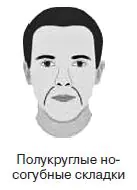
Sign of need
Straight nasolabial folds running from the tops of the wings of the nostrils to the very end, although they do not touch the corners of the mouth, indicate a bitter battle for life. Such people are often haunted by poverty and illness.
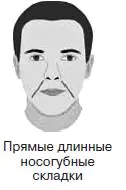
Illness sign
Fa-Ling's short lines combined with a thin nose, inverted nostrils, crooked mouth and pointed chin are a combination of the worst features of the lower face. And it belongs to a person who is in perpetual poverty and suffering from a protracted illness that can lead to early death.
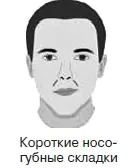
Sign of Extraordinary Power
People who, in addition to nasolabial folds and lines around the lips, also have wrinkles going up from the chin to the middle of the cheeks, have very great potential and can reach the highest heights in the political or financial world. A striking example is the face of the thirty-sixth president of the United States, ruling from 1963 to 1969, Lyndon Johnson.
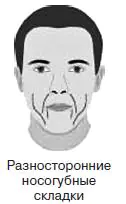
A sign of success at age sixty
If the lines of the cheeks end somewhere near the corners of the mouth, but do not touch them, and from the corners of the mouth another pair of lines emanate, going to the chin, then this person will have great success in life by the age of sixty.
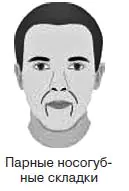
VIP Badge
The noble lines of the cheeks are those nasolabial folds that start from the tips of the nostrils, go in a smooth line to the corners of the mouth, and then diverge downward in a semicircle under the cheeks. Outwardly they resemble a long thin mustache, smoothly descending to the bottom of the chin. Such lines occur among intellectuals who occupy a high position in society.
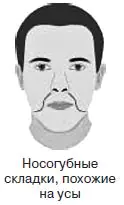
Signs of a terrible end
When the lines of the cheeks end exactly at the corners of the mouth, then such a person can end his life tragically. Chinese face readers call this phenomenon "A flying snake enters the mouth." And if two lines stretch from the lower eyelids to the mouth, this can also indicate misfortune or premature death.
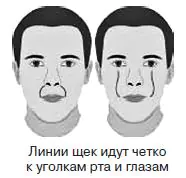
Who can “roll out their lip”
“When determining a person’s character and destiny, Chinese physiognomists consider the mouth to be one of the most important features,” says Professor Timothy Wang. – The body receives air and food through the mouth. Both are necessary to maintain life. In addition, the mouth is a speech apparatus with the help of which we express our thoughts, thus revealing our character. And finally, the size and shape of the mouth help determine a person’s internal energy: how strong is he spiritually and can he survive all deaths in spite of himself, becoming a winner?
Ideal sign
Ideal lips are when the upper and lower lips are the same size, not too thick and not too thin. The color is even, light red. Men's are hard to the touch, while women's are soft. If you have a mouth like this, it means you are a loving, generous, honest, determined person. After forty years, great success will come to you, which will become deafening after fifty.
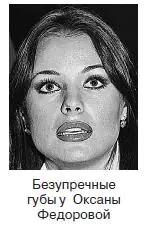
Badge of Perseverance
“Mouth of the New Moon” is the name given to lips that look like the silhouette of a new moon. The corners of the mouth are constantly raised upward in a constant smile. This is a person of a logical mindset who knows how to eloquently argue his point of view with great persuasiveness. He has the ability to focus deeply and exhibit extreme persistence. The owner of such a mouth is a very artistically gifted person.
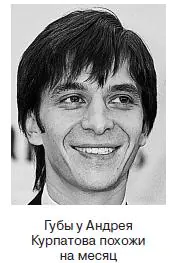
Sign of "tough nature"
Thin, narrow lips speak of emotional coldness, scrupulousness, and prudence. These people are tough people. But, as a rule, they become prominent members of society due to their extraordinary energy and boundless enthusiasm. In addition, they are resourceful and inventive. And having won the trust of such a person, you can rely on him in everything. Sometimes deep emotional experiences are hidden under the external balance of such a person.
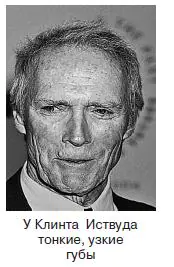
Sign of femininity
Bow lips are the most feminine. They indicate charm, coquetry, sensuality and, at the same time, insincerity and deceit. For men, this is a sign of vanity and frivolity. These people are the ones who always want to be the center of attention. But, as a rule, they are very kind, active and able to solve any problems.
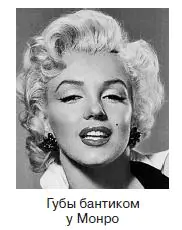
Optimist sign
Large and thick lips, as if pushed forward, are a sign of increased sensitivity and good nature. This person has good control over his feelings and emotions; it is difficult to anger him. Can give a worthy rebuff to the offender, while remaining calm. Impressive and optimistic. Friends often turn to him in moments of anxiety, seeking support and help. Loves communication and quickly makes friends.
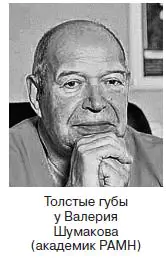
Sign of a broad soul
Good speakers have a slanted mouth, when one corner of the lips is tilted down and the other is raised. And in life they are the soul of any company. These people are somewhat prone to exaggeration, but often only to create a theatrical effect. When dealing with such a person, it is important to remember his sensitivity and the fact that he constantly uses his wit to isolate himself and protect himself. They are lucky with money, but they tend to spend more than they can afford.
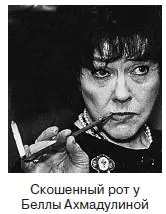
Sign of vanity
A protruding upper or lower lip, which is also slightly swollen, is evidence of a readiness to compromise and indecision. However, when everything is at stake, such a person is capable of any decisive action, rushes towards the problem and successfully resolves it. Can forgive someone who hurt him. However, he is vain. And such people have an insatiable libido, which they carefully hide from others. As people get older, they often start having extramarital affairs.
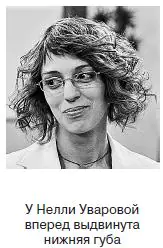
Sign of the "secular lion"
A large mouth with red shiny lips is characteristic of powerful or successful people, socialites. Such a person strives for popularity with the crowd, but protects family ties. At the same time, he does not have a clear goal in life, and he rarely brings large-scale plans to full completion. Sharp-tongued, sarcastic. In life he will enjoy everything he can, although it is possible that he will be a little greedy.
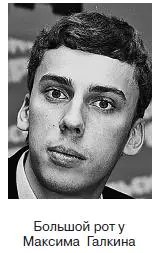
Caution sign
A small mouth, in both men and women, indicates a weak character and doubt in one’s own abilities. They constantly seek the approval of others. A little suspicious. Therefore, caution, especially in financial matters, is the innate motto of people of this type. They are often unlucky in their personal lives. But they are surprisingly honest and demand honesty from others.
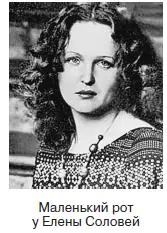
TEST

Assess the temperament of your lover(s)
The test was compiled by the famous Parisian researcher Michel Renault, who examined the lips of several thousand people.
Apply lipstick to your lips and kiss a white piece of paper. Now compare the print with the samples below. This will allow you and your chosen one to know how you feel about her (him).

Mouth in the shape of a perfect circle: the partner deserves complete trust.

Mouth in the shape of a deformed circle: attraction to you is not serious.

Mouth in the shape of a semicircle: the partner is sincere, but there are no guarantees for the continuation of the relationship.

Mouth in the shape of a deformed semicircle: promises made even in the heat of the moment will be kept.

Mouth with a straight horizontal line:
a partner with a kind big heart.

Mouth in the shape of a torn square: the partner is prone to sadomasochism.

Mouth lines in the shape of a regular zigzag: a partner who hates you.

Mouth with a deformed vertical line: a very fearful partner.
Secrets of portrait examination
Stalin’s “grandchildren” were betrayed by his nose, and Nicholas II’s “daughters” by the back of his head.
Physiognomy is not entertainment or pseudoscience. This fact is proven by my interview in the Komsomolskaya Pravda newspaper dated July 3, 2009 with a high-class specialist Alexander ZININ, professor of the Department of Forensic Expertise at the Moscow Law Academy, chief expert of the Russian Center for Forensic Expertise under the Ministry of Justice of the Russian Federation, leading researcher at the Expert Forensic Center of the Ministry of Internal Affairs, Honored Lawyer of the Russian Federation, Doctor of Law. He has been engaged in scientific research in the field of portrait identification since 1963. Here's what he said about the secrets of portrait examination.
False king
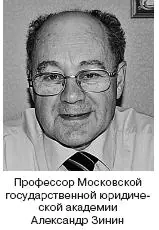
I saw Alexander Zinin in the program “The Main Hero” on NTV. He skillfully exposed two “descendants” of Stalin. The elderly men tried to convince the public that they were his illegitimate grandchildren. The leader allegedly impregnated their fathers while in exile in Siberia. The “grandchildren” were so eloquent that they became the heroes of a book by an English journalist who believed them.
And so expert Zinin was invited to the investigation. He compared the faces of his “grandsons” and portraits of Stalin, his wife Nadezhda Alliluyeva and his children – Vasily, Svetlana, Yakov. And he concluded:
– Stalin’s false grandchildren did not “read” the anthropological signs characteristic of representatives of the Caucasian population group to which the leader belonged: a different type of nose, eyes... Their Slavic appearance gave them away.
– Do you often have to expose impostors? – I asked Alexander Mikhailovich already at the meeting at the Moscow State Law Academy.
“Rarely, but it happens,” answered Zinin. – For example, we had to establish the identities of members of the family of Tsar Nicholas II.
– But were their remains identified? – I’m perplexed.
“There are people who speculate on great names,” the expert complains. – Latvian researcher Anatoly Gryannik wrote the book “The Testament of Nicholas II.” In it, he argued that the royal family was not shot in 1918, they were saved, and other people were killed instead. And the Romanovs secretly lived in Sukhumi under different names. After the death of “Nicholas II,” who bore the surname Berezkin, Gryannik met with a man to whom Romanov-Berezkin himself revealed the secret. The book contained photographs of the family, and for comparison – photographs of the royal family.
– You can’t tell at first glance. The men were elderly, with beards, and two older women had short haircuts. But I'm lucky! The archives preserve a photograph of Nikolai’s daughters after contracting measles. Also shorn and shot in profile, like the impostors. And I saw that they have different skull structures. The scammers had a slightly flattened nape, while the “originals” had an egg-shaped one.
Date added: 2018-09-22; views: 96; ORDER A JOB



